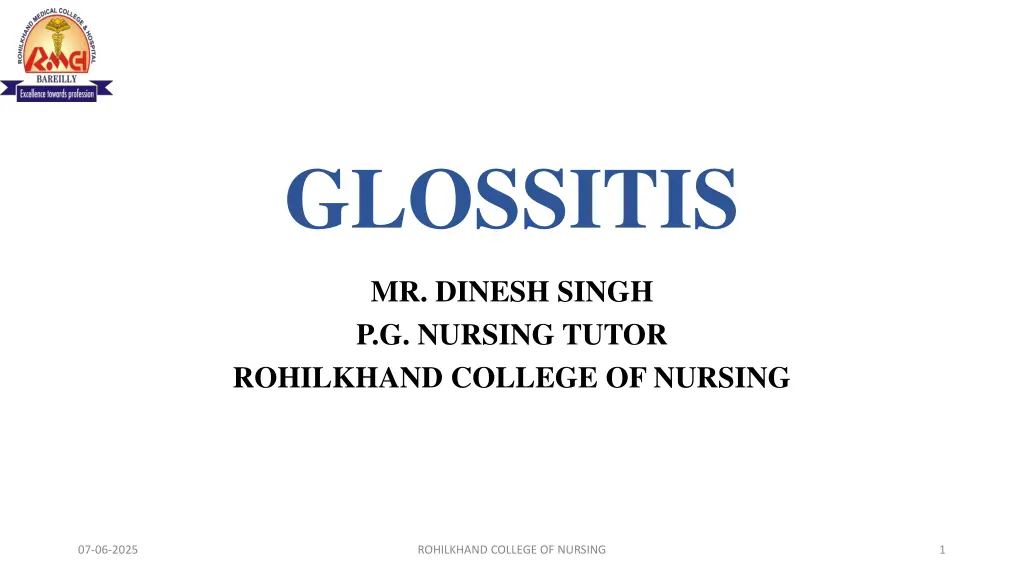
Understanding Glossitis: Causes, Symptoms, and Management
Discover the causes, symptoms, and management of glossitis, a condition characterized by tongue inflammation and swelling. Learn about the diagnostic evaluation, clinical manifestations, and prevention strategies associated with glossitis.
Download Presentation

Please find below an Image/Link to download the presentation.
The content on the website is provided AS IS for your information and personal use only. It may not be sold, licensed, or shared on other websites without obtaining consent from the author. If you encounter any issues during the download, it is possible that the publisher has removed the file from their server.
You are allowed to download the files provided on this website for personal or commercial use, subject to the condition that they are used lawfully. All files are the property of their respective owners.
The content on the website is provided AS IS for your information and personal use only. It may not be sold, licensed, or shared on other websites without obtaining consent from the author.
E N D
Presentation Transcript
GLOSSITIS MR. DINESH SINGH P.G. NURSING TUTOR ROHILKHAND COLLEGE OF NURSING 07-06-2025 ROHILKHAND COLLEGE OF NURSING 1
OBJECTIVES Introduction of the Glossitis. Define the Glossitis. Explain the causes of Glossitis s. State the clinical manifestations of Glossitis. Elaborate the diagnostic evaluation of Glossitis. Discuss the management of Glossitis. Describe the prevention of Glossitis. 07-06-2025 ROHILKHAND COLLEGE OF NURSING 2
INTRODUCTION Glossitis is a condition that causes your tongue to become swollen and inflamed. People with glossitis often have tongues that look smooth or glossy. Glossitis may appear suddenly (acute glossitis) or it may recur over time (chronic glossitis). 07-06-2025 ROHILKHAND COLLEGE OF NURSING 3
DEFINITION Glossitis is an inflammation of the tongue. It causes the tongue to swell and change color. Finger-like projections on the surface of the tongue (papillae) may be lost, causing the tongue to appear smooth. 07-06-2025 ROHILKHAND COLLEGE OF NURSING 4
ETIOLOGY Bacterial or viral infections (including oral herpes simplex). Poor hydration and low saliva in the mouth may allow bacteria to grow more rapidly. Mechanical irritation or injury from burns, rough edges of teeth or dental appliances or other trauma. Exposure to irritants such as tobacco, alcohol, hot foods, or spices. Allergic reaction to toothpaste, mouthwash, breath fresheners, plastic in dentures or certain blood-pressure medications (ACE inhibitors). 07-06-2025 ROHILKHAND COLLEGE OF NURSING 5
CLINICAL MANIFESTATION Tongue swelling Smooth appearance to the tongue due to pernicious anemia (vitamin B12 deficiency) Tongue color changes (usually dark beefy red) Sore and tender tongue Difficulty with chewing, swallowing or speaking. 07-06-2025 ROHILKHAND COLLEGE OF NURSING 6
DIAGNOSTIC EVALUATION History collection Physical examination: find the significant signs and symptoms related to Glossitis. Blood test: Complete blood count 07-06-2025 ROHILKHAND COLLEGE OF NURSING 7
MANAGEMENT The goal of treatment is to reduce inflammation. Treatment usually does not require hospitalization unless tongue swelling is severe. Good oral hygiene is necessary, including thorough tooth brushing at least twice a day and flossing at least daily. Corticosteroids such as Prednisone may be given to reduce the inflammation of glossitis. For mild cases, topical applications (such as a prednisone mouth rinse that is not swallowed) may be recommended to avoid the side effects of swallowed or injected Corticosteroids. 07-06-2025 ROHILKHAND COLLEGE OF NURSING 8
Conti.. Antibiotics, antifungal medications or other anti-microbials may be prescribed if the cause of glossitis is an infection. 07-06-2025 ROHILKHAND COLLEGE OF NURSING 9
NURSING MANAGEMENT Take balanced diet to prevent nutritional deficiencies. Avoid to eat too hot and too cold food items. Minimize irritant food like hot coffee, tea, spicy and salty food to prevent tongue discomfort. Avoid cigarettes smoking and liquors consumption. Avoid mouth allergens such as mouth wash, breath fresheners, certain antihypertensive drugs, e.g. ACE Inhibitors. 07-06-2025 ROHILKHAND COLLEGE OF NURSING 10
SUMMARY 07-06-2025 ROHILKHAND COLLEGE OF NURSING 11
REFERENCES 07-06-2025 ROHILKHAND COLLEGE OF NURSING 12
07-06-2025 ROHILKHAND COLLEGE OF NURSING 13


